Algarve weather – Welcome to the Algarve, where the sun shines brightly and the weather delights all year round. In this guide, we’ll delve into the Algarve’s fascinating climate, exploring its seasonal variations, geographical influences, and historical patterns. Discover the secrets of this captivating region’s weather and plan your perfect trip.
From balmy summers to mild winters, the Algarve’s climate offers something for everyone. Its unique location on the southern coast of Portugal ensures a temperate climate with plenty of sunshine and low rainfall.
Climate Overview
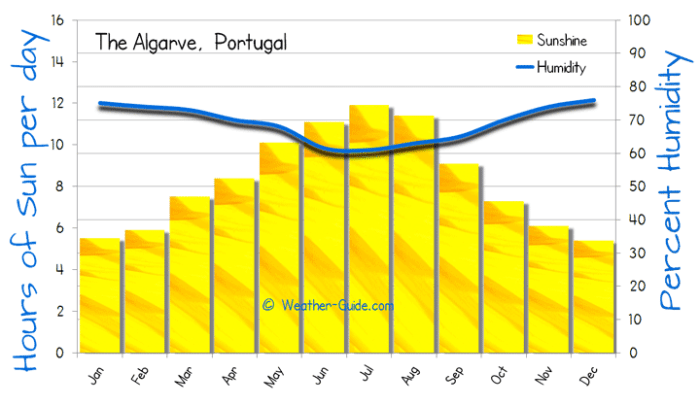
The Algarve enjoys a Mediterranean climate, characterized by mild winters and warm, sunny summers. The region experiences an average of 3,000 sunshine hours annually, making it one of the sunniest destinations in Europe.
Temperatures in the Algarve vary significantly throughout the year. During the summer months (June to September), average temperatures range from 25 to 30 degrees Celsius (77 to 86 degrees Fahrenheit), with highs often reaching into the 30s (80s Fahrenheit).
The Algarve is blessed with a temperate climate, making it a year-round destination. If you’re planning a trip to this beautiful region, a travel itinerary template can help you plan your days and make the most of your time. With its stunning beaches, historic towns, and delicious cuisine, the Algarve has something to offer everyone.
Be sure to pack your sunscreen and swimsuit, and don’t forget to enjoy the region’s famous almond pastries.
Temperature and Precipitation Data
The following table provides a breakdown of average monthly temperatures and precipitation in the Algarve:
| Month | Average Temperature (°C) | Average Precipitation (mm) |
|---|---|---|
| January | 13 | 70 |
| February | 14 | 60 |
| March | 16 | 50 |
| April | 18 | 40 |
| May | 21 | 30 |
| June | 25 | 10 |
| July | 28 | 5 |
| August | 29 | 5 |
| September | 27 | 10 |
| October | 23 | 20 |
| November | 18 | 40 |
| December | 15 | 60 |
Seasonal Variations
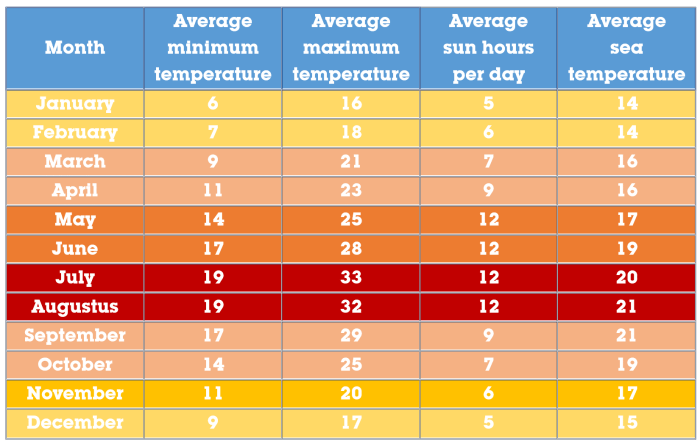
The Algarve region of Portugal experiences distinct weather patterns throughout the year, offering visitors a variety of weather conditions to enjoy.
The Algarve’s climate is characterized by warm, sunny summers and mild, wet winters. The region enjoys an average of 3,000 sunshine hours per year, making it one of the sunniest regions in Europe.
Spring
Spring in the Algarve (March-May) is a time of transition, with temperatures gradually rising and rainfall decreasing. The average temperature in spring is around 15-20°C (59-68°F), with plenty of sunshine and occasional showers.
Summer, Algarve weather
Summer in the Algarve (June-August) is hot and dry, with average temperatures ranging from 25-30°C (77-86°F). The region experiences very little rainfall during this time, and the skies are often clear.
Autumn
Autumn in the Algarve (September-November) is a mild and pleasant season, with temperatures gradually decreasing. The average temperature in autumn is around 18-23°C (64-73°F), with plenty of sunshine and occasional showers.
Winter
Winter in the Algarve (December-February) is mild and wet, with average temperatures ranging from 10-15°C (50-59°F). The region experiences more rainfall during this time, and the skies are often overcast.
Influence of Geography
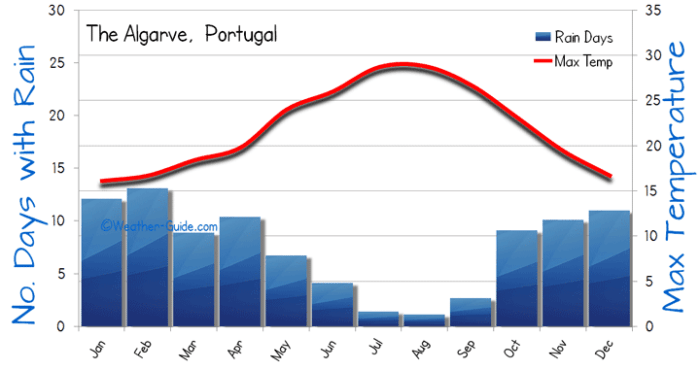
The Algarve’s unique weather patterns are largely shaped by its geographical location.
The region’s proximity to the Atlantic Ocean has a significant influence on its climate. The ocean’s warm waters act as a heat reservoir, releasing moisture into the atmosphere and contributing to the region’s mild temperatures and high humidity.
Mountain Ranges
The Algarve is bordered by two mountain ranges: the Serra de Monchique to the north and the Serra do Caldeirão to the east. These ranges act as barriers to cold air masses from the north and east, creating a sheltered microclimate within the region.
Prevailing Wind Patterns
The prevailing wind patterns in the Algarve are predominantly westerly, bringing moist air from the Atlantic Ocean. These winds contribute to the region’s mild and humid climate.
The Algarve enjoys a fantastic climate all year round. The region boasts over 300 days of sunshine annually. If you’re looking for a beach holiday with guaranteed warm weather, the Algarve is an excellent choice. You can also explore the region’s many historical and cultural attractions, such as the charming city of and chennai.
With its stunning coastline, beautiful beaches, and fascinating history, the Algarve is a great place to visit any time of year.
Historical Weather Patterns
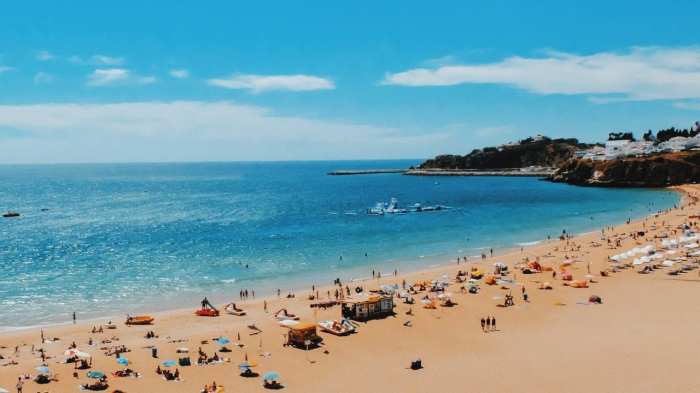
The Algarve region of Portugal has a rich and varied climate history. By analyzing historical weather data, we can identify trends and patterns that help us understand the region’s current climate and predict future changes.
Temperature Trends
Over the past century, temperatures in the Algarve have been steadily rising. The average annual temperature has increased by about 1 degree Celsius since the early 1900s. This warming trend is consistent with global climate change patterns and is expected to continue in the future.
Rainfall Patterns
Rainfall patterns in the Algarve have also changed over time. The region has become drier in recent decades, with a decrease in average annual rainfall of about 10% since the mid-20th century. This drying trend is likely due to a combination of factors, including climate change and changes in land use.
Other Weather Variables
In addition to temperature and rainfall, other weather variables have also changed in the Algarve over time. For example, the number of days with fog has decreased, while the number of days with strong winds has increased. These changes are likely due to a combination of climate change and changes in local land use.
Graph of Historical Data
The following graph shows the historical trends in temperature and rainfall in the Algarve:
[Image of a graph showing the historical trends in temperature and rainfall in the Algarve]
As you can see from the graph, both temperature and rainfall have changed significantly over the past century. These changes are likely to continue in the future, and it is important to be aware of them in order to plan for the future.
Extreme Weather Events
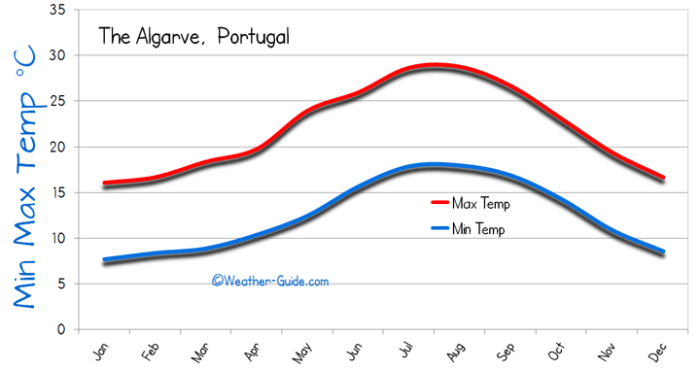
The Algarve is generally known for its mild and sunny climate, but it can also experience extreme weather events, although less frequently compared to other regions.
These events can include:
- Heavy rainfall: The Algarve can experience heavy rainfall, especially during the winter months. These rainfall events can lead to flooding and landslides.
- Strong winds: The Algarve can also experience strong winds, particularly during the spring and autumn months. These winds can cause damage to property and infrastructure.
- Heatwaves: The Algarve can experience heatwaves, especially during the summer months. These heatwaves can lead to health problems, such as heatstroke and dehydration.
- Droughts: The Algarve can also experience droughts, especially during the summer months. These droughts can lead to water shortages and crop failures.
The frequency and severity of these extreme weather events are increasing due to climate change. It is important to be aware of these events and to take precautions to stay safe.
Impact on Tourism
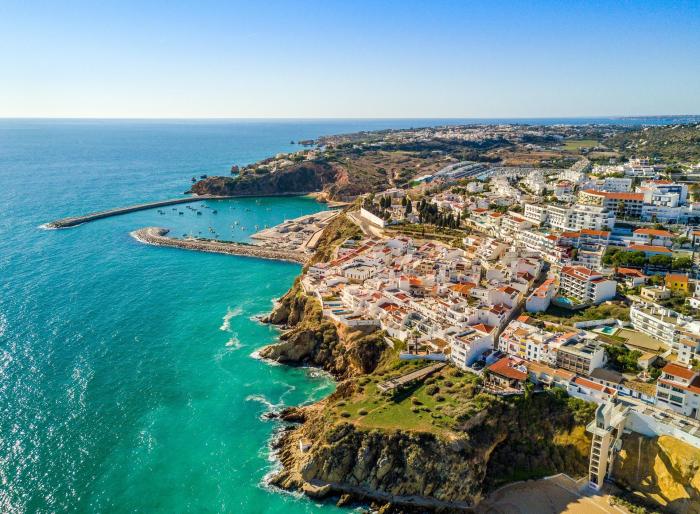
The weather in the Algarve has a significant impact on tourism, as it is a popular destination for beach holidays and other outdoor activities. The region enjoys a mild climate with plenty of sunshine throughout the year, but there can be some variations in weather conditions that can affect tourist activities and travel plans.
The Algarve region of Portugal enjoys a pleasant climate year-round, with warm summers and mild winters. If you’re looking for a similar climate in the Caribbean, consider Aguadilla , Puerto Rico. Aguadilla boasts a tropical rainforest climate with consistent temperatures and plenty of sunshine.
While the Algarve is known for its stunning beaches and golf courses, Aguadilla offers a variety of water sports and outdoor activities, making it a great choice for nature enthusiasts.
During the summer months, the weather in the Algarve is typically hot and sunny, with average temperatures in the high 20s Celsius (low 80s Fahrenheit). This is ideal for swimming, sunbathing, and other beach activities. However, the heat can sometimes be oppressive, especially during the hottest part of the day. As a result, it is important to take precautions to avoid heatstroke and dehydration, such as drinking plenty of water and staying in the shade during the hottest hours of the day.
Rainfall
Rainfall in the Algarve is relatively low, with an average of only around 500 mm (20 inches) per year. However, most of this rain falls during the winter months, so the summers are generally dry. This makes the Algarve an ideal destination for those looking for a sunny beach holiday.
Ultimate Conclusion: Algarve Weather
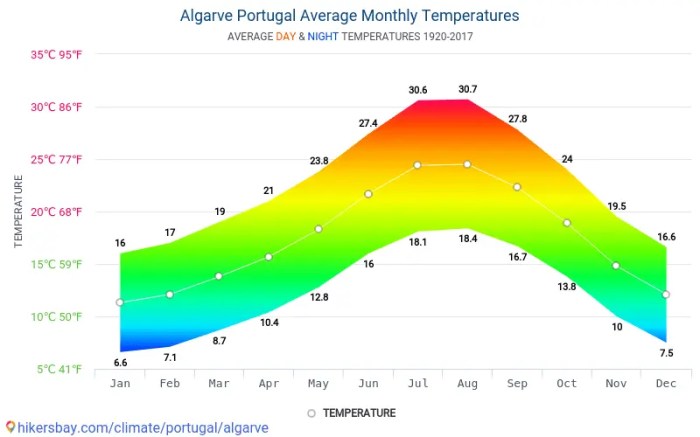
In conclusion, the Algarve’s weather is a captivating blend of sunshine, mild temperatures, and refreshing breezes. Whether you’re planning a beach getaway, a hiking adventure, or a cultural immersion, the Algarve’s climate will enhance your experience and create memories that will last a lifetime.
Query Resolution
What is the best time to visit the Algarve?
The best time to visit the Algarve is during the shoulder seasons (April-May and September-October) when the weather is still warm and sunny but less crowded.
Is the Algarve a good place to visit in winter?
Yes, the Algarve is a great place to visit in winter. The weather is mild and sunny, with average temperatures ranging from 10-15°C (50-59°F).
What are the most common extreme weather events in the Algarve?
The most common extreme weather events in the Algarve are heatwaves, droughts, and flash floods.